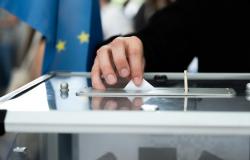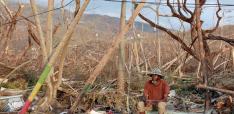Charting a New Course? What’s at Stake in the 2024 EU Elections

The challenges facing the next class of EU legislators are significant. ENSURED's Dylan Macchiarini Crosson on what the election means for the EU's role in global governance.
Going into the EU elections, what are the major issues that voters are considering? What are the biggest challenges facing the EU in the next legislative period?
EU voters will be called to vote on 6-9 June 2024 in the European Parliament elections, with the date varying in each EU member state. While often used by voters to assess their own government’s performance, the EU elections present an opportunity for European citizens to shape the EU’s policy agenda over the next five years. What is more: the resulting political balance within the European Parliament will play a key role in shaping the European Commission for years to come.
According to the latest Eurobarometer results, European citizens have a wide range of topics on their minds: from poverty and socio-economic inequality, public health, jobs creation, security and defence, to food and agriculture policy. With so much to address and elections just around the corner, the conversation in the Brussels bubble is sadly more about the political balance of the forthcoming legislature rather than the substance voters care about. Hopefully, the same isn’t true for the rest of the European Union.
Because the challenges for our next class of EU legislators and decision-makers are significant: Russia’s illegal war against Ukraine trudges on at enormous humanitarian and economic cost to the EU, struggles with economic growth are hurting the EU’s international competitiveness, and the EU’s credibility within the so-called Global South is waning.
Addressing these issues will require a unified EU that is both poised to act quickly and craft long-term European strategy with an eye towards peace. Looking forward, what will the election mean for EU foreign policy? What are possible scenarios depending on the outcome?
Traditionally, the European Parliament does not play a major role in EU foreign policy, which itself tends to be less susceptible to changes in the political balance than other policy fields. The multi-level nature of decision-making, the veto power of EU members within an unanimity-based system, and the generally cautious nature of EU diplomacy normally keeps EU foreign policy on a steadier course. However, external circumstances – namely the ongoing wars in Ukraine and Gaza – are sending shocks throughout the EU foreign policy system and begging it to adapt into a more united and impactful actor.
Therefore, the degree to which the EU may (or may not) change course is only partially dependent on European Parliament election results. Based on current polling, we are likely to see is a conservative-led European Commission that is supported by far-right groups. Under their direction, the EU will likely seek a realist-driven stability in its southern and eastern neighbourhoods in line with the past five years. What is still up in the air, however, is how the top jobs will shake out and which personalities will make up the future President of the European Commission, the High Representative for Foreign Affairs and Security Policy, and the President of the European Council.
Another unknown – though with a potentially high impact for EU foreign policy – is what type of ripple effects may cross the Atlantic following US elections in early November.
What is at stake from a global perspective? How will the election impact the EU’s role in multilateral institutions?
In the next five years, much is at stake for the EU as a global actor. Regardless of election results, Europe will continue to grapple with Russia’s illegal war against Ukraine, the modalities and opportunity of EU enlargement in the Western Balkans and Eastern Europe, the future of the European security order, questions of nuclear non-proliferation and disarmament, peacebuilding in the Middle East and Sub-Saharan Africa, the rise of economic protectionism and geoeconomic competition driven by Sino-American rivalry, as well as a global decline in human rights protections and the quality of democracy. Additionally, the rise of the Global South – particularly those states within the BRICS+ format – will put current multilateral rules and institutions to the test, especially at a time when the legitimacy of the ‘west’ is being called in question by its response to the war in Gaza.
In all reality, Europe’s role in multilateral institutions is unlikely to change post-election. However, calls for the EU to chart a course that better reconciles its values-based rhetoric and perceived policy inconsistency are only growing louder. As such, the EU would do well to place itself on equal footing with BRICS+ countries and table a genuine discussion about how to make multilateral institutions more democratic and responsive to ongoing international challenges. Lending diplomatic and material support to these efforts – to be renewed at the forthcoming UN Summit of the Future – will be key to re-establishing the EU’s credibility as an international actor and bolstering the multilateral system that it firmly believes in.
Dylan Macchiarini Crosson is a Researcher in the CEPS EU Foreign Policy unit and a member of the ENSURED consortium.
This first appeared on the ENSURED website.
Photo: European Parliament / Flickr


